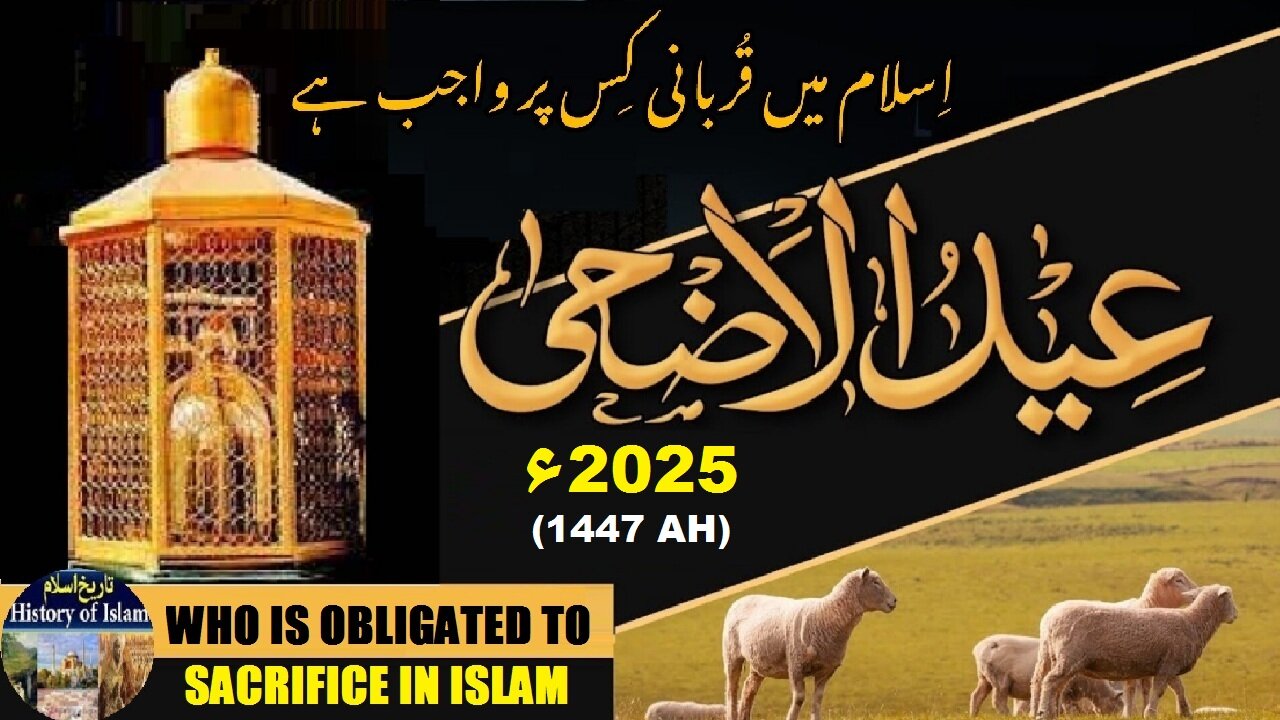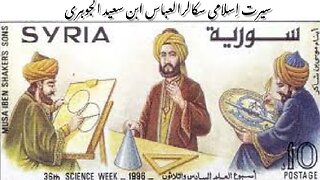Premium Only Content

Who is Obligated to Sacrifice इस्लाम में क़ुरबानी किस पर वाजिब है اسلام میں قربانی کس پر واجب ہے
@islamichistory813 #eidaladha2025 #qurbani #islam #eiduladha
#sacrifice #wajib #islamicrules #udhiyah #muslim #guide #islamic #knowledge #qurbani2025
Let me know if you want hashtags tailored for Urdu-speaking audiences as well.
Would you also like a short description or video hashtags for this video?
Who is Obligated to Sacrifice in Islam?
Asslamoalaikum Sisters, Brothers friends and elders, today In this islamic informative video regarding Eid ul Azdha, we are describing Who is obligated to sacrifice in Islam? Delving into the religious texts and teachings, we clarify the criteria for those who must participate in the act of sacrifice, particularly during the significant occasion of Eid al-Adha. Please be with us upto end of this video as we are describing the spiritual significance, the types of animals that can be sacrificed, and the underlying principles that guide this practice. Whether you are a practicing Muslim or simply curious about Islamic traditions, this video provides valuable insights into the obligations and responsibilities associated with sacrifice in Islam. Don't forget to like, share, and subscribe for more informative content!
Sacrifice, is an important act of worship in Islam performed during the days of Eid al-Adha. It commemorates the willingness of Prophet Ibrahim (Abraham, peace be upon him) to sacrifice his son Ismail (Ishmael, peace be upon him) for the sake of Allah, and how Allah substituted a ram in his place. This act is not merely symbolic but holds deep spiritual significance, reminding believers of the values of obedience, submission, and generosity. However, not every Muslim is obligated to perform Qurbani. Islam lays down specific conditions that determine who is required to offer this sacrifice, and these are derived from both the Qur’an and authentic Hadith.
The obligation of Qurbani is not mentioned in the form of a direct command in the Qur’an, but it is implied through various verses. Allah says in Surah Al-Kawthar verse 2: **“So pray to your Lord and sacrifice [to Him alone]. This verse is understood by many scholars to refer to the Eid prayer followed by the act of sacrifice. Another relevant verse is found in Surah Al-Hajj verse 34: **“And for every nation We have appointed a rite [of sacrifice] that they may mention the name of Allah over what He has provided for them of [sacrificial] animals. These verses highlight the general importance and spiritual nature of sacrifice, emphasizing that it is a well-established practice in divine law.
When it comes to the obligation, the clearest guidance comes from the Hadith of Prophet Muhammad (peace be upon him). According to the Hadith narrated by Imam Tirmidhi, the Prophet (peace be upon him) said: **“Whoever has the means and does not offer a sacrifice, let him not come near our prayer place.”** *(Sunan Ibn Majah, Hadith 3123). This Hadith strongly discourages neglecting the sacrifice for those who are capable, indicating that it is at least *wajib* (necessary) according to many scholars.
In terms of the people upon whom Qurbani becomes obligatory, Islamic jurists have outlined a few essential conditions. According to the Hanafi school of thought, Qurbani is *wajib* (obligatory) on every adult Muslim who is *sane*, *free* (not a slave), and *possesses wealth equal to or above the Nisab threshold—the same minimum amount of wealth that makes Zakat obligatory. The Nisab is approximately the value of 87.48 grams of gold or 612.36 grams of silver. If a person owns this amount or more in savings, stocks, trade goods, or any other form of wealth that exceeds their basic necessities, then Qurbani is obligatory upon them.
The Maliki, Shafi’i, and Hanbali schools generally regard Qurbani as *Sunnah Mu’akkadah* (a confirmed Sunnah), meaning it is highly recommended and the Prophet (peace be upon him) never missed it, but it is not strictly obligatory. Even so, many scholars from these schools agree that it is a serious neglect to abandon Qurbani if one is able to afford it. The strong language of the Hadiths indicates the seriousness of performing this sacrifice.
Children, travelers, and those who do not possess wealth above the Nisab threshold are not required to perform Qurbani. Similarly, those who are in debt and cannot afford the cost of the animal after covering their basic needs are also exempt. Women, just like men, are obligated to perform Qurbani if they meet the financial criteria. This includes women who earn their own income or possess personal wealth equal to or above the Nisab.
The animal to be sacrificed must meet certain conditions: it must be a goat, sheep, cow, or camel that is free from defects and of the appropriate age. The sacrifice must be done after the Eid prayer and within the designated days of slaughter—10th to 13th Dhul Hijjah. The one performing the sacrifice should also intend that it is for the sake of Allah. Allah says in Surah Al Hajj verse 37 “Their meat will not reach Allah, nor will their blood, but what reaches Him is piety from you.”. This verse emphasizes that it is the sincerity and devotion behind the act, not the flesh and blood, that is valued by Allah.
In conclusion, the obligation of sacrifice in Islam is linked to one’s financial capability and spiritual responsibility. While all Muslims are encouraged to participate in this noble act during Eid al-Adha, only those who are financially able—meeting or exceeding the Nisab—are strictly required to do so. Through sacrifice, Muslims express their gratitude to Allah, revive the tradition of Prophet Ibrahim (peace be upon him), and share the blessings of Eid with the poor and needy. Let us all remember that the essence of Qurbani lies in devotion, obedience, and the desire to seek Allah’s pleasure.
May we all have to try strive to walk in the footsteps of Prophet Ibrahim and Isma'il (peace be upon them), and may Allah accept our sacrifices and grant us the strength to be among those who surrender wholeheartedly to Him. We pray to Allah Almighty to grant every Muslim the ability to perform the Sunnah of the Most High and not to make anyone dependent on any human being. Ameen
Allah Hafiz
=================
-
 7:53
7:53
ISLAMIC HISTORY
1 day agoBiography of Al-Abbas ibn Said al-Jawhari سیرت العباس بن سعید الجوہری
8 -
 2:11:35
2:11:35
Pop Culture Crisis
3 hours agoElon Declares 'CANCEL NETFLIX' Trump Threatens Hollywood, Bad Bunny Superbowl Boycott? | Ep. 927
9.36K1 -
 3:26:05
3:26:05
Barry Cunningham
4 hours agoPRESIDENT TRUMP IS READY TO GO SCORCHED EARTH! SHUTDOWN DAY 2 BRIEFING!
17.5K20 -
 DVR
DVR
The Trish Regan Show
1 hour ago🚨Trump’s TRIUMPH! DEMS HUMILIATED on LIVE TV as SHUTDOWN BLAME BACKFIRES!
7.4K7 -
 1:39:14
1:39:14
Dr. Drew
6 hours agoFL First Lady Casey DeSantis: Florida Ending ALL Vaccine Mandates, Including For Schools w/ FL Surgeon General Dr. Joseph Ladapo & Tom Renz – Ask Dr. Drew
44.7K5 -
 23:51
23:51
Stephen Gardner
2 hours ago🔥Trump RAGES! Putin’s Plot REVEALED — Bill O’Reilly Breaks His Silence!
11.8K23 -
 1:14:58
1:14:58
vivafrei
7 hours agoHe Was There! Charlie Kirk Assassination Analysis & Conspiracy Debunking w/ Andrew Piskadlo!
74K70 -
 1:05:57
1:05:57
Russell Brand
5 hours agoPfizer Agrees $70 Million Deal With Trump As Study Links Covid Vax to CANCER!! - SF644
108K84 -
 48:25
48:25
JULIE GREEN MINISTRIES
4 hours agoLIVE WITH JULE, ERIC TRUMP AND CLAY CLARK
45K93 -
 1:04:57
1:04:57
The Quartering
6 hours agoTrump Tricks Democrats Again, Cheerleader Monster, Abortion Clinics Shutdown & More
95.2K34
